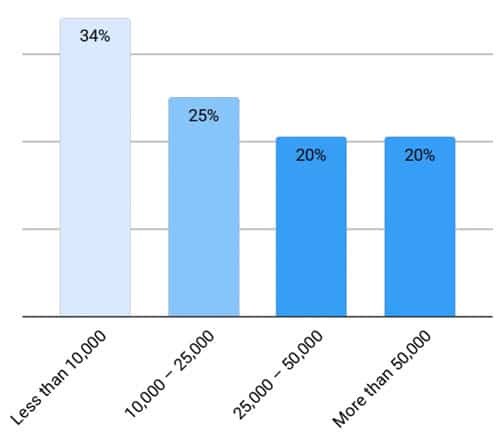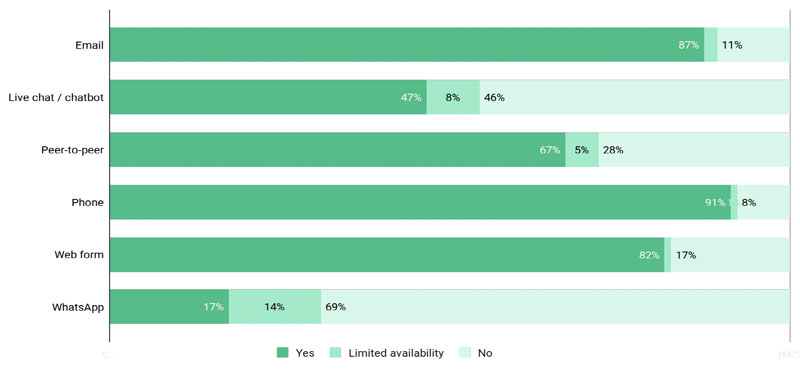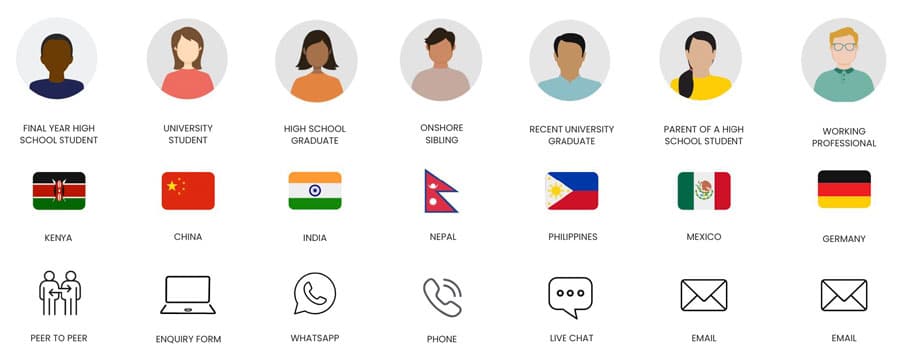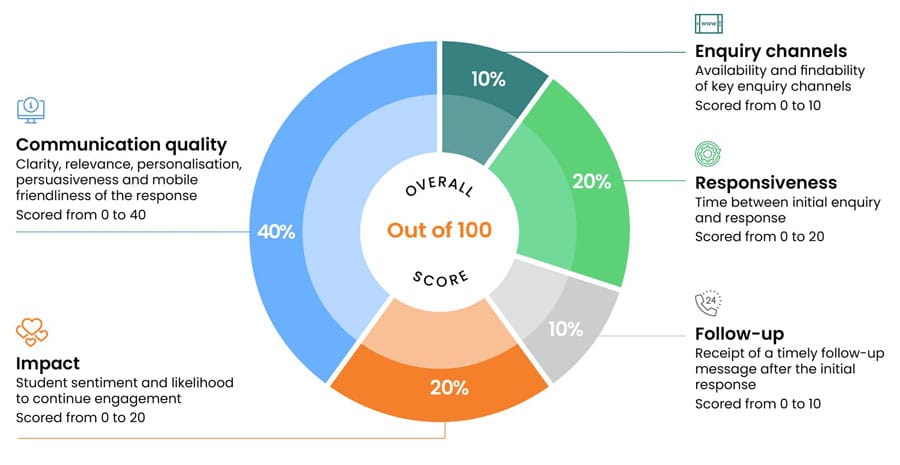Mystery shopping study finds broad improvement in student enquiry handling this year
- An annual study finds that institutional responsiveness to international student enquiries is generally improving this year, and more so when measured over the four years of the research programme since 2022
- There is also a clear finding that there is still a fair bit of variability in communications channels and institutional effectiveness in responding to enquiries across the sector
- What is equally clear is that better and more impactful responsiveness to student enquiries remains an important source of advantage in an increasingly competitive marketplace
The results are out for Edified's annual Enquiry Experience Tracker study, and they reflect the best overall performance yet in the four years that the programme has been running. "Students face a flood of information from websites, rankings, social media and agents as they search for the right fit," sets out the study report. "When a student contacts a university or college, it’s a key moment to build trust and help move a student closer to their decision. Strong service can be the difference between winning or losing a student."
This year, the report also does a nice job in setting the context for enquiry management by providing some important takeaways from a survey of 49 responding institutions. Those findings highlight, for example, that two out of five universities in the sample report receiving more than 25,000 international student enquiries every year.

Near nine in ten (85%) of the responding institutions report using either a standalone or fully integrated CRM system to help manage those enquiry volumes. A similar proportion (84%) say that they use marketing automation tools as well. Edified adds that while the use of such tools is widespread, it is "at varying levels of sophistication globally."
The institution survey also provides an interesting window into the enquiry channels supported across universities. As we see in the figure below, email and phone remain the most commonly available options.

The 2025 Enquiry Experience Tracker
The average overall scores in the tracker study rose by 10% year-over-year to reach a four-year high point. The proportion of responses rated as "excellent" rose from one-third to 58%, and the share of interactions characterised as "negative" fell from 33% to 18%. This reflects, says Edified, "how intense global competition is driving universities to sharpen their interactions with prospects."
The 2025 study is based on enquiries filed with 103 institutions in five countries, across six enquiry channels (e.g., email, web enquiry form, WhatsApp, or other) and using seven student personas. Roughly a third of the institutions in the study were in the UK, another 28% were in Australia and New Zealand, just over a quarter in Canada, and 7% in the United States (all in the state of New York).

The mystery shoppers' interactions with each university were then evaluated against 51 criteria, including "findability, responsiveness, clarity, and personalisation." The scores for each are weighted according to the following model and used to generate an overall Enquiry Experience Score (out of 100) for each institution in the study.

The results
Overall scoring improved this year to a global average of 61, which represents a six-point improvement from the 2024 study. As we see in the figure below, however, the scoring varied a fair bit by region, with institutions in Australia and New Zealand showing the strongest performance. Also of note: each region in the 2025 study either improved or equalled their ratings from 2024.

The four years of the Enquiry Experience Tracker study reflect a steady improvement in enquiry handling, with global ratings rising from 51 in 2022 to this year's overall score of 61.
Key findings
Beyond those institutional, regional, and global scores, the Enquiry Experience Tracker model has some important insights to offer.
Channels are not always on. Some of the enquiry channels that students find most meaningful – such as peer-to-peer, live chat and WhatsApp – are not always available, meaning students are essentially asked to fall back to more traditional channels like email to reach the institution.
For example, only 70% of institutions provide options to chat with current students, and just over half have live chat or chatbots. WhatsApp is the channel least likely to be offered with two-thirds of this year's mystery shoppers unable to locate WhatsApp details. The significant of this rests in part in the fact that students found WhatsApp the most satisfying enquiry channel in every region. It is an option that, when available, offers greater responsiveness (all students in the study received an answer to their queries via WhatsApp and 80% of those came within two business hours. "The experience was so good," says the study report, that "6 in 7 students said they’d be likely to engage further."
Responsiveness is improving generally. Across the 2025 study, response rates and speed in responding improved. Edified reports: "Half of replies met best practice timeframes, up from four in ten last year."
The report adds, "Response rates improved slightly, indicating that institutions are paying closer attention to their lead pipelines amid shifting policies and growing competition. On average, ANZ institutions are the most responsive, answering more than 95% of enquiries placed with them, followed by UK institutions, who replied to 85%. Response rates in North America were less consistent. One in four students didn’t hear back after placing enquiries to Canadian and US institutions in the time allowed for this research (three weeks for email and 15 minutes for live channels)."
Enquiry responses are becoming more effective. This year's study finds that most institutions improved their communications in the last year and delivered both the key information that students need but also an element of persuasion as well. "Nearly 80% of responses were tailored to students’ study interests or country and 60% went the extra mile to include bonus information to help students," adds the report. "Globally, half of communications were rated as ‘excellent’ against our standard – a further improvement on previous years."
Follow-up remains a big challenge. While the study reflects better performance in terms of the initial reply to a student enquiry, serious issues remain in terms of any further follow up activity. Only one in four mystery shoppers received follow-up communications in the 2025 study, although this was up from one in five last year.
The report notes an important variation in follow up practice in that, "Students who placed web form enquiries were followed up with the most often, with 45% receiving nurture emails. This indicates a growing capability in data integration and consent management globally. Follow-ups were lowest for phone enquiries, and less than one in ten students heard back from institutions after their call."
The bottom line. Most students in the 2025 study felt positively about their interaction with the institution(s). But one in five still said they would be unlikely to continue engaging beyond the initial exchange with the institution, mainly because the responses they received were impersonal or lacked warmth or a more personal touch. Just over half of the students in the study reported a positive experience, and more than four in ten said they would be "very likely" to keep engaging with the institution.
"Getting the basics of enquiry management right is not always enough to win hearts," says Edified. "Student feedback shows they most value the institutions that anticipate their needs, give personalised responses and make them feel genuinely welcome."
Recommendations
Working off of those important findings, the study report offers a series of recommendations for enquiry management.
- "Apply a conversion mindset." Each enquiry is an opportunity to guide the student to choosing your institution. Put your unique sales points forward, offer value-added details that speak to the student's concerns, and close with practical next steps in the process.
- Open up mobile channels. Many students may prefer to interact on messaging apps, but relatively few institutions offer this option.
- "Don’t send students on a scavenger hunt." Rather than relying on links to provide information, answer the student's questions directly and meaningfully in your reply. "A more thoughtful reply builds trust and shows students what they can expect if they choose to study with you," says Edified.
- Commit to ongoing improvement. Student concerns, expectations, and even channel preferences are changing all the time. "Stay connected with your recruitment and in-country teams to identify shifts or challenges early, and adjust your content and channels accordingly," concludes the study report.
For additional background, please see:
















